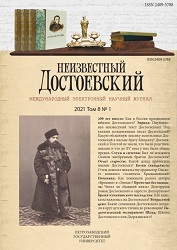«Не прюдствуй, читая это»: тень Баркова в текстах Достоевского
“Don’t Be Abashed Reading This”: Shadow of Barkov in the Texts of Dostoevsky
Author(s): Irina Svyatoslavovna AndrianovaSubject(s): Cultural history, Russian Literature, 19th Century
Published by: Петрозаводский государственный университет
Keywords: Fyodor Dostoevsky; Mikhail Dostoevsky; Pavel Karepin; Mikhail Saltykov-Shchedrin; Ivan Barkov; barkoviana; barkovschina; “Luka Mudishchev”; textual criticism; satire; pun; irony; parody;
Summary/Abstract: The subject of research in this article is a partially crossed out portion of a letter from Fyodor Dostoevsky to his brother Mikhail dated September 30, 1844. This letter communicates his decision to leave the military service and devote himself to professional literary work. The entry was first reproduced in the edition of Dostoevsky’s correspondence prepared by A. S. Dolinin, and then in the academic Complete Works. However, this was done with distortions and without proper commentary. As a result, the entry was perceived by readers as a rude expletive, which included slang, obscene vocabulary, and insults to the guardian of the Dostoevskys, P. A. Karepin, who opposed the switch of his ward to a literary path and was in no hurry to provide him with financial assistance. Textual analysis of the record about Karepin demonstrated that the strikethrough was made twice — by Dostoevsky himself at the time of writing the letter, and almost 40 years later by his widow, who was preparing the letters for publication. Due to her shyness, A. G. Dostoevskaya could not tolerate obscene words contained in the body of the letter, and she removed them with a thick strikethrough, while encrypting their meaning using shorthand. The restoration of the complete record made it possible to determine the source of the quote, namely, the “indecent” poem Luka Mudishchev, written in the post-Pushkin period and attributed to Ivan Barkov, but not written by him. The fact that Dostoevsky knew this poem by 1844 narrows down the range of its dating. In the heat of his “struggle” with Karepin, who criticizes the “abstract laziness and bliss of Shakespeare’s dreams”, the novice writer turns the obscene satirical language of Barkoviana against his guardian in a sharp pamphlet style. Continuing his observations on common people’s speech in the Siberian Notebook and the Writer’s Diary, Dostoevsky came to a paradoxical conclusion about the combination of profanity and chastity in the Russian people. The writer’s viewpoint on this matter was not clear to his contemporaries and was ridiculed in journalism and caricature.
Journal: Неизвестный Достоевский
- Issue Year: 8/2021
- Issue No: 1
- Page Range: 42-60
- Page Count: 19
- Language: Russian

